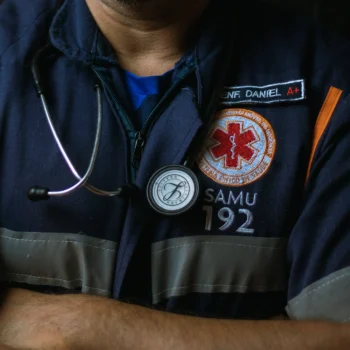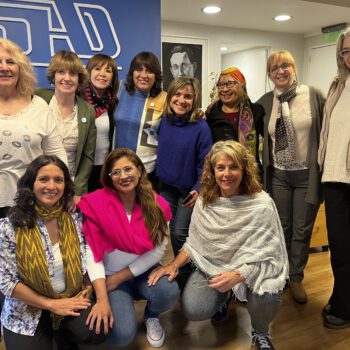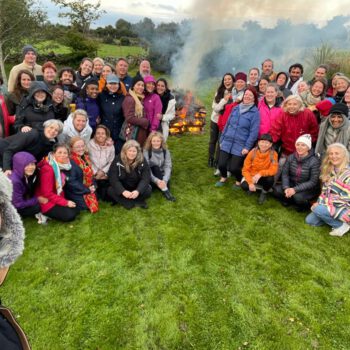Siri Dharma / Sheila Tyacke is a Lawyer, Mediator, Legal Trainer & Mentor, Founding Compassionate Inquiry® Practitioner, Training Facilitator & Counselor with training in Nonviolent Communication, Family Life and Addiction Counseling. The lead South African trainer for the Beyond Addiction Program, she additionally spent more than 15 years teaching Kundalini Yoga for addiction recovery in primary rehab.
This post references a short excerpt of Siri Dharma’s story of transformation and healing through Compassionate InquiryⓇ. Listen to her full interview on The Gifts of Trauma Podcast.

Photo credit: Stockcake
As a founding facilitator and practitioner of Compassionate Inquiry®, I also train and mentor young lawyers in a top tier corporate law firm. So I live at the intersection of law and compassion.
In its Johannesburg office alone, my law firm takes in ~40 young people a year. More than half are young black lawyers with multiple layers of trauma from the apartheid years. They’re not coming in through families that have trained them to survive in the corporate world. Like me, when I started, they’re new to the corporate culture. As a teaching lawyer, I empower them in as many ways as I can, teaching them the corporate ropes plus what they need to know about the firm’s work; mergers and acquisitions, tax and contract law, legal writing, drafting contracts. By helping them practically and easily understand the most complex mergers and corporate deals, I provide a bridge between what they learned as top law students and the professional skills they need as practicing lawyers. I also provide compassion, which is rare or nonexistent in most corporate realms.
The firm gives us lots of time together, and these young people come to trust me. As they are under tremendous pressure and full of anxiety, when the opportunity arises, we engage in mindfulness practices, or Compassionate Inquiry.® Just last week, after leading a mindfulness practice, I noticed one of the young men had tears streaming down his face. Then one of the young lawyers said, “I just got feedback from a senior lawyer. I messed up.” So I said, “That’s interesting. I’m wondering what you’re making that mean?” This opened a discussion. As a young black person, and the first in his family with a job in the corporate world, there’s incredible pressure on him to keep his job. He’s putting his younger brother through school and his family is depending on him financially. So if he gets into trouble at work, what does he make it mean? Through this inquiry, he was able to see that what had been activated predated that moment at the law firm.
This duality between my work in law and counseling has always existed. Through all my years as a lawyer, I was also teaching yoga, through which came the great blessing of teaching yoga in a primary drug rehab. I was blown away by the gift of sitting with a group of 30 addicts. After that came leading the Beyond Addiction Program, next I met Gabor and then I became a founding facilitator for Compassionate Inquiry.®
If you wonder about the role Kundalini Yoga plays in the addiction recovery process, at the simplest level, it gets people to move, to breathe. This is also the basis of Gabor’s addiction work. ‘Don’t be the addict, see the addict.’ You can be in incredible pain, locked into all sorts of patterns, but as you develop the witnessing eye, there is healing, because the witness is the true self. Every time I get to work with addicts and gently help them ‘see the addict’, it’s a blessing to witness the blossoming of their presence and awareness. I don’t know how anyone can recover from anything, without that.
I was born in Johannesburg, South Africa, and have lived here all my life. I grew up in an anti- apartheid family during the apartheid era; experienced violence, shunning and shaming by others. It was a brutal experience, yet as a white person, I wasn’t in the most decimated population. I had a certain amount of privilege.
My parents raised us in the lower middle class suburbs where the people were ultra racist. Back then in South Africa, everything was racial and everything was separate… white area, black area, indian area. People in my high school went around bashing people just because of the color of their skin. It was incredibly violent. There was a, ‘don’t go to their house’ sense from other kids and their parents. My sisters and I experienced that kind of exclusion all the time, largely due to our parents’ unpopular political views, and our father’s work in training black consciousness, aligning workers in empowerment through trade unions.
When I was twelve, my parents received a banning order; an apartheid repression tool. They were both banned, so they had to give up their work immediately and were confined to white areas in a small part of Johannesburg. They had to check in at the police station every week and couldn’t enter a court or a school. They couldn’t be published, gather with more than two people at a time, and even needed special permission to talk to one another.
For my sisters and I, in this racist environment, there was no way to explain why our all powerful government didn’t approve of my family. It’s strange for children when their parents have experiences like this. It’s confusing. They’re out there doing something important and now, looking back, I’m proud of them. But at the time, it was a source of shame. What are my parents doing? How embarrassing!
I still live in Johannesburg, which has one of the world’s highest crime rates. Every day, scores of cars are hijacked and houses are robbed by armed bandits. It’s not safe here. So it may seem ironic that I co-lead the Safety and Connection course for Compassionate Inquiry.® We talk about this in our gatherings, and I tell participants, “When I’m walking to the store I never carry a phone or cash with me. And when a car drives next to me, I often think, Oh my God, I’m going to be robbed, as my nervous system is in an activated state.” If I’m in a different country, I can drop the tension, but one day it would be nice to feel safe here. Until then, I know how to be vigilant, and I’ve got a radar for reading the scene when it comes to danger. I think these skills come from childhood trauma.
– – –
The Gifts of Trauma is a weekly podcast that features personal stories of trauma, healing, transformation, and the gifts revealed on the path to authenticity. Listen to the interview, and if you like it, please subscribe and share.




Comments are closed.